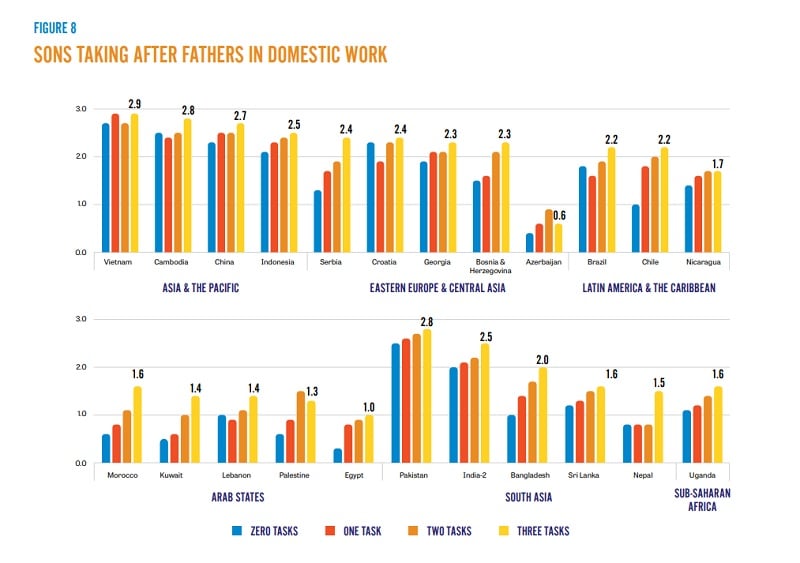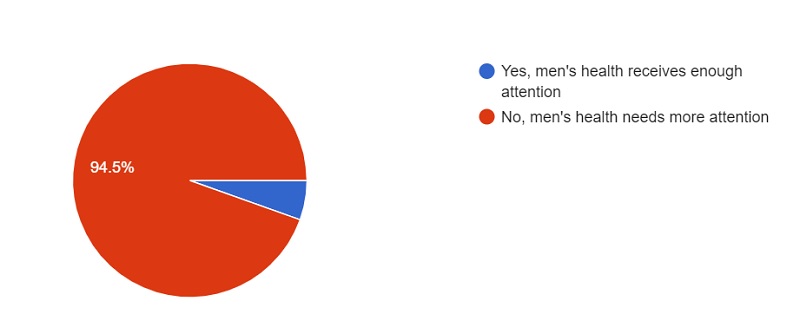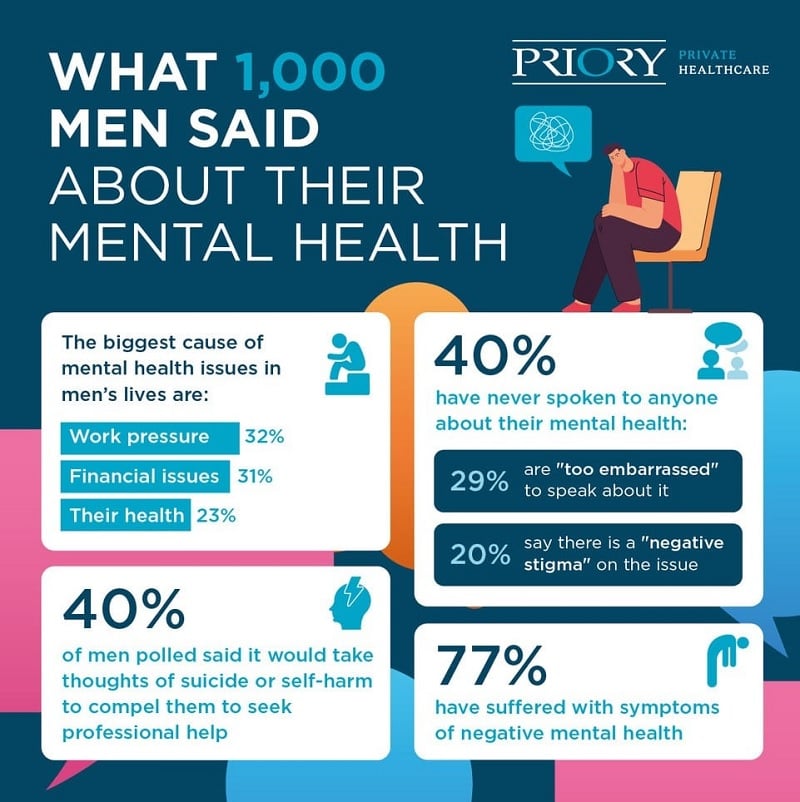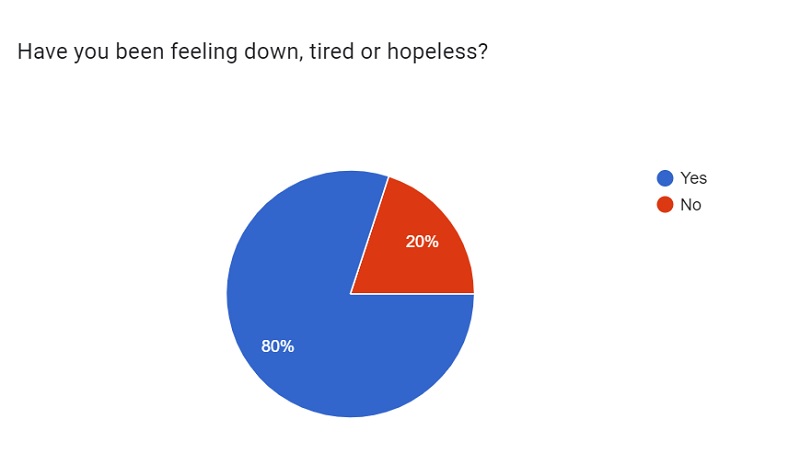The economic crisis mounts major stress on the meal-tickets. They, being the living-makers, are at the forefront of this day-to-day struggle to put food on the table. How can they really go on like this without going insane? Let’s find out.
It is no news that in the world in general and in Pakistani society specifically, men are the breadwinners in the family. This means that in case of inflation and unemployment, men, having the responsibility to provide food, clothes, and shelter, are more prone to undergo mental health problems.

“No one really cares about men’s mental health including men,” Arham Siddique, a mechanical engineer from Karachi shared his thoughts with Geo.tv.
While several studies have shown that men go through several problems like depression, anxiety, drug addiction, and post-traumatic stress disorder and are also more likely to die by suicide than women, nobody, especially in Pakistan seems to be talking about it.
Geo.tv carried out a survey and found that 94.3% of men believe that their mental health does not receive enough attention.

“Political turmoil in the country, world situation after COVID-19, Russia-Ukraine war, shrinking work opportunities, companies closures, the rise of electricity bill, and high petroleum prices are making it worse for common men to live with dignity,” said Rizwan from Sialkot.
The inflation rate in the country soared to 14-year of 24.9% in July. A shocking 30% of the respondents reported being unemployed amid these conditions and nearly 36% reported earning less than Rs50,000 in times when fuel prices and electricity bills combined are enough to empty the bank.
How does a breadwinner put food on the table? How do they afford other fundamental needs like medicines, house rent, and education? Expectedly, over 81% reported being stressed out due to inflation.

“Spouse plays an important role in keeping the mental health of a man stable, after all, it’s all about the family,” said 23-year-old Amir Sheikh.
However, unfortunately, some single men shared their concerns regarding marriage, saying that women and their families desired wealthier men which leaves them further under pressure and takes away the opportunity to have a partner in life at all.
“Financially challenging times disrupt the communication patterns of couples or family members, lead to increased conflicts among them and eventually impact the quality of marital relationship and cause relationship difficulties in general,” Dr Sobia Aftab, Associate Professor of Clinical Psychology told Geo.tv.
The majority of the men shared that they were constantly asked about employment.
Some respondents also mentioned that they had sacrificed their dream careers and quit the pursuit of advanced education, only to take up the duty to provide.
“Encouragement and a little push of motivation from time to time are perhaps all they (men) need to keep the wheel spinning,” Sheikh added.
“Just give men some break once in a while”, “ask men as well if they are okay”, and “allow them to be vulnerable”, were some requests the respondents made.
“The expectation for men to “stay strong” is I think the culprit,” shared a respondent from Lahore who chose to stay anonymous.
“Men usually like to put on a “tough guy” persona, bottle things up, pretend everything is fine while they are dying inside,” he said adding that men needed to unlearn these ways so things can get better for not only their own health but also the next generation.
Do men victimize themselves though? Doesn’t seem so. When asked whether inflation affected men more than women, 53.8% said it affected whoever earned regardless of gender. About 28% of the respondents believe it affects men more and 18% think it impacts both genders equally.
The findings also noted that most families had more than one person earning. Only 17% of men reported being sole earners, while the rest had at least one more person in the family who was earning. It is unclear whether these people were fellow men in the family, women, or both. Regardless, the results showed that most homes, unlike in the past, are now running on multiple incomes.
The survey also asked some questions from the Patient Health Questionnaire (PHQ-9) which is not a screening tool for depression but is used to detect the severity of depression and response to health treatments. Almost 80% of men reported feeling down, tired or hopeless, 71% reported sleep troubles, and 62% said that they felt bad about themselves, as if they are a failure or have let their family down.

Unfortunately, a surprising 30% even reported having thoughts about death.
“There’s a massive stream of young, lonely men who constantly get put down in society,” a respondent from Rawalpindi, who chose to be anonymous, wrote.
Some respondents pointed out men’s physical health and said that sudden deaths via heart attacks and the prevalence of chronic health issues in men could be due to stress as well. This is consistent with a plethora of scientific studies that show the impact of work stress on physical health.
Several respondents said that there was a dire need to talk more about the topic and kill the stigma around the discussion.
“Awareness is the key,” they said.
“Whenever someone hears he should visit a psychologist, people get offended as they believe only the mentally insane go to a psychologist,” remarked Mudassir from Pir Mahal.
Mudassir and Arham’s comments hint toward a bigger problem: Men’s casual attitude toward their health and considering taking therapy a weak man’s deed.
Dr Aftab explains that Pakistan is a society where men are authority figures, for them “seeing a psychologist portrays them as ‘weak’ and ‘dependent’ who failed to handle their problems.”
“Overthinking, anxiety and stress are common,” a respondent acknowledged but most men also pointed out that they were laughed at when they tried to open up and talk about emotions.
“Masculine men are still more appealing in society” believes Yusuf from Karachi.
Some respondents believe that fighting the stigma, access to clinical psychologists, and affordable therapy can make the situation better.
Dr Aftab agreed, stressing the role of media for awareness messages and programs. She also recommended men surround themselves with positive people who appreciate and help them to cope with their struggles.
It is important to note that only 9.4% of the respondents in the survey were above the age of 32. Additionally, most of them were educated young men. Geo.tv understands that more in-depth research with larger and more diverse sample size is required.


